| |
"In looking at Don’s movies, I feel a masterly touch. Every shot is the kind of filmmaking that I respect the most. It’s not just a jumbled shot for the sake of the action. It’s a concise shot that guides the viewer’s eyes specifically to what the filmmaker feels the viewer needs to know... As a person and as a filmmaker, he was a guy who didn’t wax flowery or waste a lot of words. He was very direct and specific in what he said, and you could always count on him." |
| |
Director Phil Kaufman on Don Siegel* |
Siegel came to my attention early in my cineaste past. Even though I watched all eighty minutes of it, I'd seen barely fifty per cent of his 1956 Invasion of the Body Snatchers on television. It was a horribly presented pan and scanned version that 'redirects, recuts and reframes' the director's work just to fill what used to be the near square glass teat to its edges with a distinctly square-resistant oblong frame. In fact, it was the first film – after buying the VHS Letterbox version with its Superscope, 2.00:1 aspect ratio (happy days) – on which I did a side-by-side comparison. Panning and scanning widescreen motion pictures is like spitting in the filmmaker's face but then when did respect for film or filmmakers ever matter to anyone outside the industry? Am tempted to say inside too. A famous director who's since passed on (I think it was John Frankenheimer) once said that if he ever saw one of his movies on TV pan and scanned, he'd hit the bottle, hard. There is no way any television viewer can appreciate the work of three of the four most creative and important craftspeople of filmmaking... director, cinematographer and editor. All three's contributions are horribly compromised. The fourth, the writer, may escape the resulting butchery of panning and scanning but their work is hardly well served as a result. Needless to say, my appreciation of Siegel has only increased steadily the more of his films I got to see. Right up there with Dirty Harry and Invasion of the Body Snatchers is Charley Varrick.
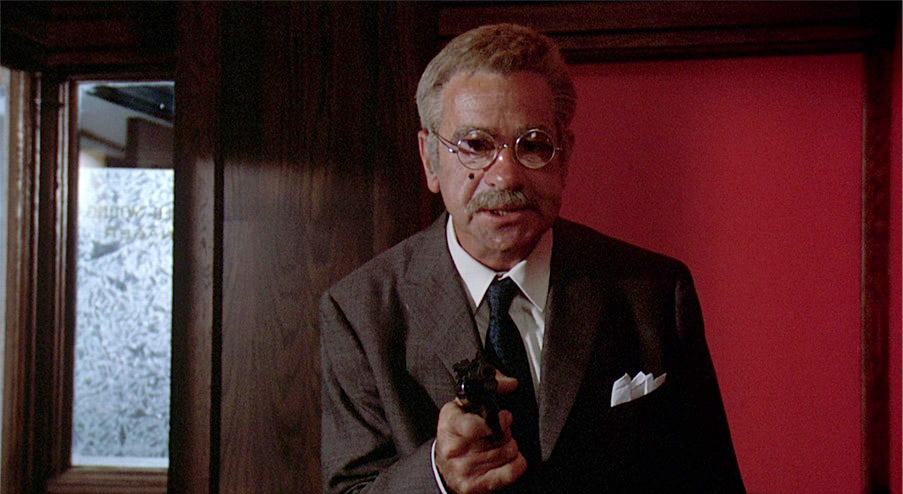
Walter Matthau, certainly one of the most idiosyncratic actors of his generation, is Charley Varrick, a crop dusting pilot who subsidises his income with small time bank robberies. Charley, with his wife and cohorts, goes to some dramatic lengths to disguise himself (plaster casts, additional facial hair) and then blithely pulls a gun on a bank teller and a frightened manager to secure the cash while his masked buddies keep the staff and customers covered. Two problems occur off the bat. Firstly, perceptive local law enforcement recognises the thieves' car number plates as being on its hot list. Suspicion results in premature gunplay and bullets are exchanged way before the robbers get out of the bank. Against significant odds and sporting a soon to be fatal wound, Varrick's wife and getaway driver Nadine, drives the gang to neutral ground after a certain amount of realistic (and apparently unintended) vehicular mayhem. There Varrick and his surviving cohort Harman, set a timed explosion to wipe out the car and burn his wife's body. Once safe in Charley's trailer, the two surviving criminals discover that not only have they hit the jackpot but it might also seal their fate and not in a good way. Three quarters of a million dollars tips Varrick off that this was a mob money laundering operation and he asks Harman to lay low for three to four years, something the hot-headed youngster refuses to do. Varrick takes a swig of milk, says "OK, kid. You're calling it..." and you just know the end is near for his partner in crime. Varrick then has to figure out how not to get killed by the mob, caught by the police and, if possible, keep the money. The joy of the movie, despite and because of the wealth of unsavoury characters is its ingenuity and the rare narrative device mostly shunned by mainstream Hollywood today, that of the movie keeping its cards very close to its chest.
All we know for sure is that Matthau is scared and wants to stay alive. He knows his only surviving fellow robber, the impulsive Harman, will fall foul to the dark machinations being put in place to punish the pair in inventively horrific ways. We are never privy to the moment when Matthau starts his intricate plan (probably after that swig of milk) but every single step is hugely entertaining. Beyond that, his behaviour is never telegraphed and if it is, it's revealed later to be deliberately done so. There are scenes served up to the audience cold with no warning, scenes that have to be quickly interpreted to understand characters' actions. I'm referring to how Matthau solves one huge problem by getting the other bigger problem to solve it for him. This is a masterful stroke by the writers and Siegel's precise direction and the complementary editing of Frank Moriss make it work superbly well. It's interesting to note that Moriss was one of the young Steven Spielberg's first editors having worked on his Name of the Game episode and more markedly, Duel. There's not a dull moment in the entire film and only one absurdly implausible scene, something the Trailers From Hell writers mention in their commentary on the extra included in this release. Never has the question "Now, what's he doing that for?" been asked so many times with such joy and anticipation instead of frustration. We're with Charley all the way right down to the literal tripwire.
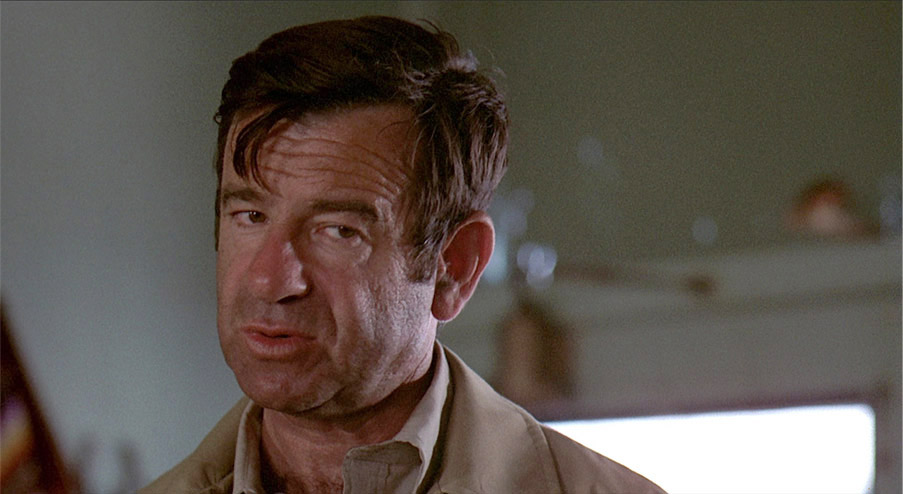
Matthau, unlike any physically perfect Greek gods of movie stardom, was a quirky, smart and funny character actor whose movie roles were often defined on how singular he looked. Lugubrious and often hangdog in expression and always seemingly surprised by and tolerant of events that surround him, he was never really cast as a romantic lead. In fact Matthau could be the very personification of New York, Jewish sardonic. Even when he smiles, he gives the impression that he's engaged in heavy lifting. It is mind-boggling to imagine Clint Eastwood (Siegel's original choice) as Varrick and having the movie work as well as it does. Why? Because Eastwood is invulnerable even in movies in which he's injured or killed. Varrick is a schemer, a role which fits Matthau like the proverbial glove. Eastwood wouldn't be scared of Joe Don Baker... At arguably the film's most emotional moment, the death of Nadine, Matthau plays it pitch perfectly. He's a professional crook whose normal MO has blown up in his face and mourning a loss is simply not on his immediate 'must do' list. If this seems callous, then it's there to be read too. His own life is in danger. Mourning comes later. Hot-headed Harman is played with a manic energy by the Dirty Harry Scorpio killer himself, Andy Robinson. That may have been his breakout role giving Clint and his Magnum the run around but for Outsider's crew, his Garak on Deep Space Nine will always be a highlight of this great actor's career not to mention the sublime "Jesus wept!" at the tail of Hellraiser. The rest of the cast are uniformly excellent. Animal House's Dean Wormer, John Vernon, gives the crooked businessman and mafia colonel Boyle some depth. His power plays and understanding of the bigger picture may be flawed but the scene of him pushing a girl on a swing is oddly compelling. He's trying to see the bank manager but petty officialdom stands in his way. He's sweet to Holly on the swing but underneath there's a growing frustration, one that a man of his power is not used to experiencing. The four-minute uncut shot of Vernon talking to the bank manager is a fine display of thespianic professionalism. He has a constantly barking dog, mooing cows and rogue clouds screwing up his light to contend with and he nails it. Jacqueline Scott as Nadine draws the short straw, one of the victims of the shooting. It may seem just given she starts the whole shooting match killing a curious cop with a shot from inside her handbag. But from all the supporting cast, one man's shadow looms the largest.
It's not difficult to regard No Country For Old Men's existential assassin Anton Chigurh, played by a deliciously demented Javier Bardem, as a nod to Molly in Charley Varrick. There is never any explanation for why this mountain of a man has a distinctly feminine name but we'll go with it. Hollywood's most famous gunslinger started life as Marion Morrison figuring changing it to 'John Wayne' may get him more work. Let's not forget Firefly's Jane, another mighty slab of a man. Joe Don Baker has been a favourite of mine since his turn in the original television production of Edge of Darkness. It says something about an actor's impact when you can still recall his character's name from memory (Darius Jedburgh) and his sweating, radiated face straining forward as he slowly dies in front of our eyes. In Varrick, he's the killer-for-hire, the burly six foot three inch sadist who seems to enjoy his work just a little too much. For every chess piece put in place by a desperate Charley, there's a frame filling appearance from Molly and then subsequent violence. There's a character moment I found hard to read but that says more about my personal deficiencies. Molly finds the photographer Jewel who fakes passports (played alluringly by Sheree North). I'm not sure if there are missing scenes but Molly treats her as if they have already had a conversation. She's awfully casual about this giant of a man breaking into to her studio. He arrives later, asks for a beer, gets aroused by the sight of Jewel bending over (a shot no sane director would shoot today and there are three such shots in the movie) and with his left hand leads her into what is presumably the bedroom. She has shown not an inch of compliance until (someone help me out here) he slaps her with the back of his right hand. A flash of anger from her and then a smile and she moves to him as the door closes. Is this how to seduce a woman? To quote John Cleese "What's wrong with a kiss, boy?" I'm familiar with some people's wishes to be dominated and indeed the idea that some people find pain pleasurable but they've only just met. OK, out of seven and a half billion of us, there are bound to be people wired differently but someone needs to explain to me how a backhanded slap from a man twice a woman's size is meant to turn her on. This isn't some post-Weinstein plea for ethical and reasonable sexual behaviour. It's more "how does sharp jaw pain instruct the brain that this is someone with whom I'm happy to mate." Times, they are a-changing...
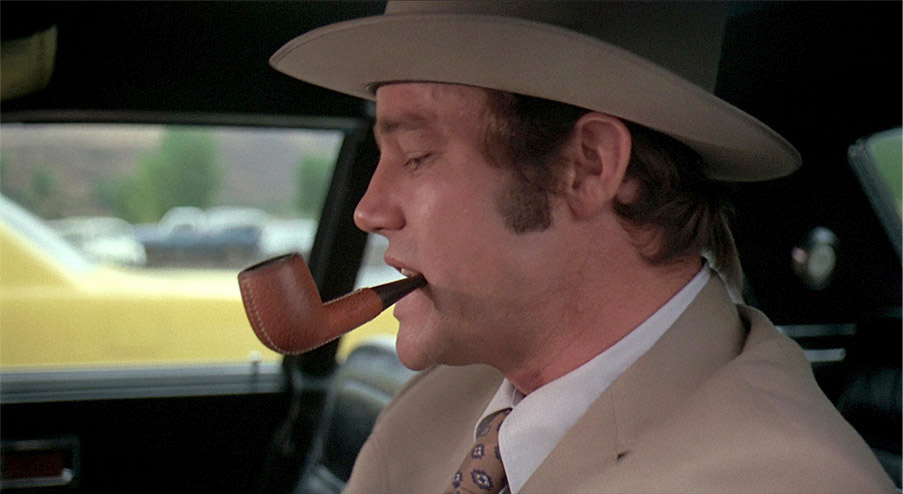
The era-specific and instantly recognisable score by Lalo Schifrin also makes me smile. One of my favourite TV shows in the late 70s was Starsky and Hutch and Schifrin scored the pilot with the same quirky instrumentation. It seems like such an insignificant thing now writing from afar but I was really pissed off they changed the first season theme tune. There are parts of that pilot episode I can still quote verbatim which worries my friends. And this was before VHS. Can you believe I used to tape the audio of beloved shows with a microphone? As well as a classic 70s score, Charley Varrick also has its odd quirks and directorial gags that you spot after several viewings. The all-American opening with the laid back jazz piano with cowboys and farmers all starting their days might convince you that The Waltons had made it to cinemas, all golden light and stunning vistas. The score makes a rock turn while grass is cut and pretty ladies are ogled by townsfolk. In absolutely no way does this prepare you for ten per cent of the mayhem to follow. I adored it! Director Siegel turns up as a badly post-dubbed losing Ping-Pong player (oddest cameo ever) with his trademark patch-covered hat. There are a few zoom ins and outs that are optically done in post-production for no discernable reason. As the door closes on a soon to be intimate pair we cut to a slow optical zoom out from a pot of yoghurt, cottage cheese and some milk. Was there a scratch or hair in the gate that couldn't be removed to force the post tinkering? When Matthau visits a gun seller for information, he throws some paper into a trashcan and we zoom in to the trashcan for no reason whatsoever. Am fairly sure it was not for the pleasure of reading what was written on its side – "I Eat Litter - Keep Albuquerque Clean". Just before that scene Charley is on the phone to Harman and framed outside is a wooden six-shooter advertising the gun shop pointing straight at his temple. All through the conversation, you're made aware that Charley indeed does have a metaphorical gun to his head.
Charley Varrick is a hugely satisfying crime drama with almost a complete absence of good guys. Matthau as Charley is sympathetic and we're always on his side but we are often asked to forget that he's a crook in the same way that Siegel expected us to root for Clint Eastwood in Escape From Alcatraz even though we are unclear why he was in prison in the first place. If I was going to get behind a crook, then Matthau's my go-to guy. The movie suffers only from the era's societal norms in which it was made. Casual racism and sexism are notable but they hardly poison the well. Take a good look at one of the 70s' best...
Has anyone else out there noticed that in the old Universal logo, the 'S' is crooked? Been like it for years. Presented in the 1.85:1 original aspect ratio, Charley Varrick looks just terrific. The increased detail in this format is always a thrill. The contrast range is good with detail in the blacks and all the exteriors look lovely. You just have to love 35mm film.
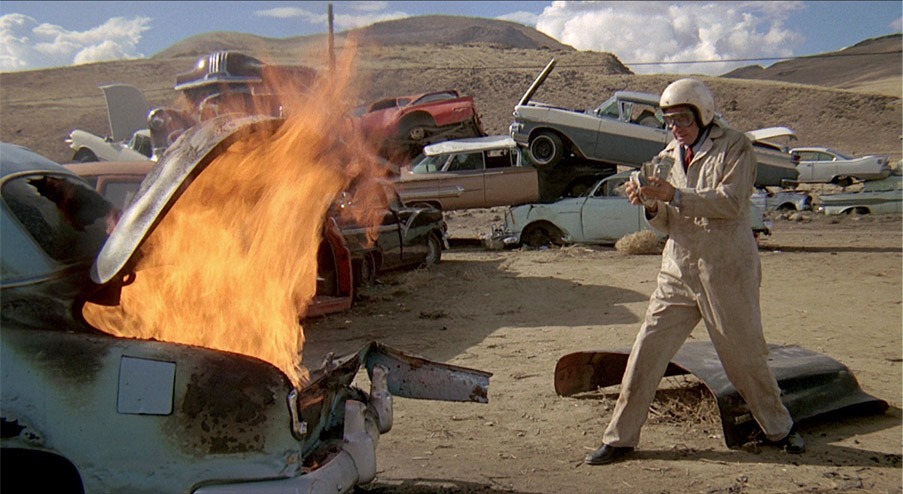
The original mono soundtrack is clear and every word easily discernable. In fact the Schifrin score despite its mono rendition sounds pretty damn fine.
There are new and improved English subtitles for the deaf and hard-of-hearing.
Last of the Independents: Don Siegel and the Making of Charley Varrick (2015): feature-length documentary containing interviews with actors Andy Robinson and Jacqueline Scott, stunt driver Craig R. Baxley and Siegel's son, Kristoffer Tabori (1 hour 15' 19")
The above title tells you all you really need to know about the extra itself. Again, if you're a fan, you'll revel in the myriad details and if you don't feel like researching why the surname of the son of a man called Siegel is called Tabori, then let that mystery stew for a while. I'll give you a clue. He's an actor. I loved composer Schifrin outing the name of the instrument that represented Matthau's scheming mind – the 'flapamba' invented by a Hollywood percussionist. This is a solid feature length 'Making of' that does the movie and its fans proud.
The John Player Lecture with Don Siegel (1973): archival audio recording of an interview conducted by Tony Sloman at London's National Film Theatre (1 hour 13' 59")
This Tony Sloman fellow (well known to cinephiles of my vintage), sounds awfully like Barry Norman. I understand in communication with disc producer Michael Brooke that the first press announcements went out with Norman credited with the interview. Michael has since suggested the time between recordings and the lesser quality of the earlier recording means it's not absolutely provably Norman and the supplier of the interview was insistent that this is, in fact, Tony Sloman. I watched Barry Norman for decades. Despite the ambiguity, I'd bet good money that this was Bazza... None of this matters one jot but what does matter is that it is a fantastic extra with Siegel at his dour and cynical best. There's a lovely atmosphere because Siegel is such a down to earth character that revels in naming himself merely a 'hack director'. He is anything but. But his crafted 'just doing it for the money' shtick is well honed and there are a lot of laughs. Norman/Sloman is also obviously having a ball. As will you.
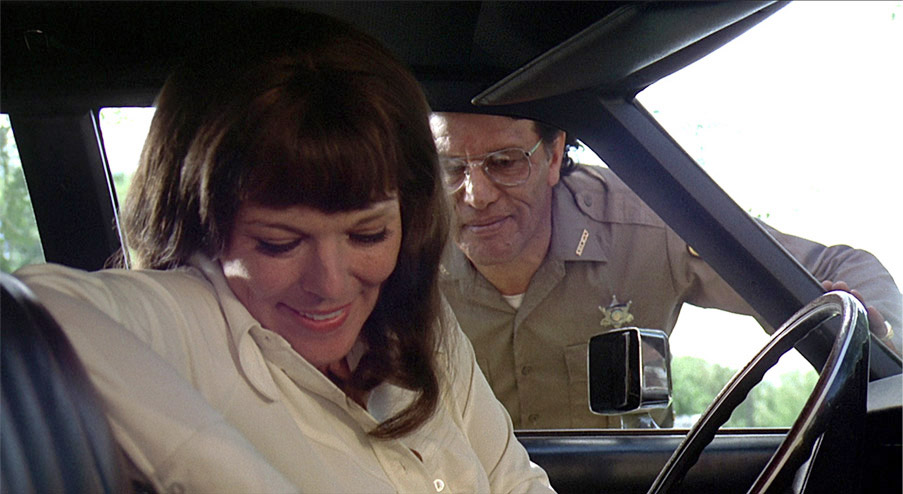
The Guardian Lecture with Walter Matthau (1988): archival audio recording of an interview conducted by Tony Sloman at London's National Film Theatre (1hr 28' 42")
Recorded fifteen years later, to my untrained ear, this sounds like (drum roll) Tony Sloman. Matthau is in great form and reminds you of his comic roots. Almost every story has a punch line and the actor comes across as hugely likeable. It's clear everyone's enjoying themselves. His stand out line was saying that the best directors say the least to actors and just tell stories. And during the Second World War in 1943, he was stationed in the UK with his commanding officer Jimmy Stewart. Noting that he shared some traits with the more famous actor at that time (they were both tall, skinny and could speak English), Matthau felt that he had a good shot at getting in "...on that racket." Good thing too.
Super 8 version: original 'Universal Eight' cut-down home cinema presentation (17' 34")
This is fairly dirty (print damage mostly), washed out somewhat and cropped to a 4:3 frame but considering all that, it is still a compelling version of the film that keeps the entire car vs. plane chase and the rest of the ending intact. I was quite surprised how effective it still was. Back in the day, pre-VHS, 8mm film was the only format you had some control over when choosing to watch something at home the three TV channels at the time weren't providing. But to a film-obsessed teen, the cut down 8mm reels were fabulously expensive. I accepted the 8mm versions had to be cut downs but I can still reference the frustration I felt when in my 8mm version of Alien, Ripley blows the ship up, says "I got you, you son of a bitch..." and that's where it ended! Noooooooooo!
Original theatrical trailer (02' 23")
This understandably uses the word 'Varrick' many times in the first minute so that we know this unusual name is the name of the Walter Matthau character. Movie titles are curious beasts and an odd name can be both a blessing and a curse. This is a standard trailer of its day, which only uses the voice of God twice (the second time intoning the poster's tag line). The trailer's narrative is mostly told by the movie clips. I was surprised to see a chunk of the climax in the trailer but then while the feature can hold its cards close to its chest, a trailer really can't. It has an altogether different job to do and it does it well enough. It's presented in HD and is in remarkably good nick. The trailer also features Siegel's preferred title seen here in a sub-title... The Last of the Independents.
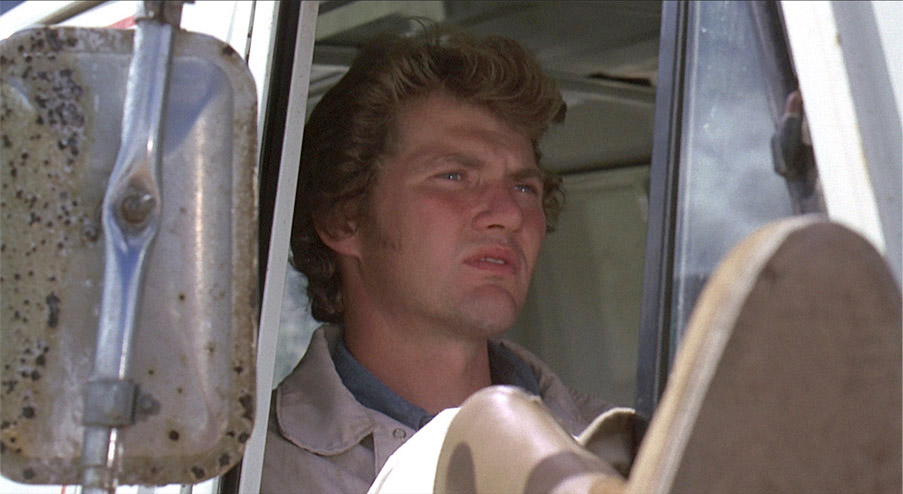
Josh Olson and Howard Rodman trailer commentary (2013): a short critical
appreciation (5' 46")
The excellent series 'Trailers from Hell' brings us two noted screenwriters and two fans of Varrick, Olson and Rodman who share their insight on the movie and deliver a commentary on the trailer. Rodman mentions something he teaches his students; that a great screenplay is one surprise after another going forward and going backwards one inevitability after another, a lovely idea which Olson then chooses to steal and originate as his own "This is Hollywood, right?" The two men are easy together and in front of the camera and point out Varrick's single "No way!" scene, one that had me pushing against the limits of the movie's mostly satisfying internal logic. Walter Matthau breaks into the villain's secretary's apartment (they have never met until then), threatens to throw her out of a window if he doesn't get what he wants, and what seems like a moment later, they're in a circular bed having just had sex. Matthau has his charms but in a matter of minutes?
Image gallery: on-set and promotional photography
There are 66 black and white stills, some presented two on screen which essentially follow the narrative in order. The final ones, with one lovely one of Siegel getting a bear hug from Matthau are behind the scenes shots. These are followed by 33 colour stills, 1 front-of-house still, 1 VHS cover, and 11 international posters of which the Polish is the most striking for its oddness.
Limited edition exclusive 40-page booklet with a new essay by author and critic Richard Combs, Don Siegel on Charley Varrick, an overview of contemporary critical responses, and film credits
This was not available for review but Combs has a well-earned pedigree for great writing on cinema so I will assume this can only enhance this terrific Blu-ray release.
Expertly plotted, superbly performed and told with such a sure directorial hand, what's not to love about Charley Varrick? It's precision and slow burn narrative, never actually sluggish in pace, is the work of a man who sweats the details regardless of his self-promotion suggesting he's anything but a gifted director. This is a work from another kind of Hollywood Golden Age, the much-revered (for very good reasons) 1970s. Heartily recommended.
|